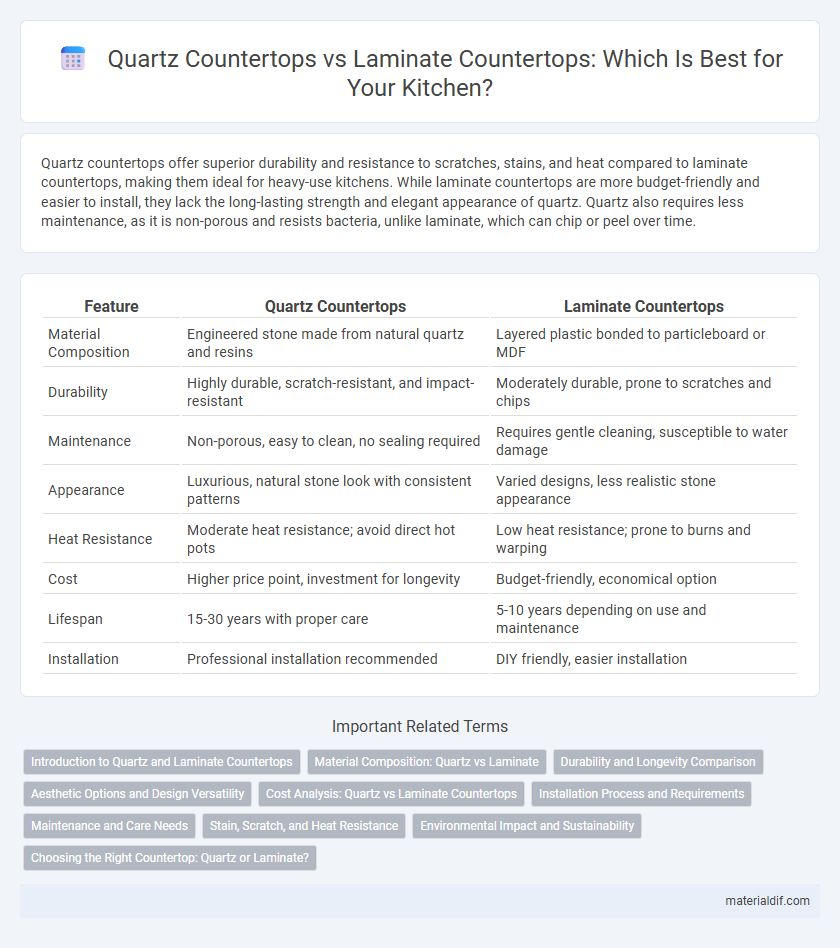Quartz countertops offer superior durability and resistance to scratches, stains, and heat compared to laminate countertops, making them ideal for heavy-use kitchens. While laminate countertops are more budget-friendly and easier to install, they lack the long-lasting strength and elegant appearance of quartz. Quartz also requires less maintenance, as it is non-porous and resists bacteria, unlike laminate, which can chip or peel over time.
Table of Comparison
| Feature | Quartz Countertops | Laminate Countertops |
|---|---|---|
| Material Composition | Engineered stone made from natural quartz and resins | Layered plastic bonded to particleboard or MDF |
| Durability | Highly durable, scratch-resistant, and impact-resistant | Moderately durable, prone to scratches and chips |
| Maintenance | Non-porous, easy to clean, no sealing required | Requires gentle cleaning, susceptible to water damage |
| Appearance | Luxurious, natural stone look with consistent patterns | Varied designs, less realistic stone appearance |
| Heat Resistance | Moderate heat resistance; avoid direct hot pots | Low heat resistance; prone to burns and warping |
| Cost | Higher price point, investment for longevity | Budget-friendly, economical option |
| Lifespan | 15-30 years with proper care | 5-10 years depending on use and maintenance |
| Installation | Professional installation recommended | DIY friendly, easier installation |
Introduction to Quartz and Laminate Countertops
Quartz countertops consist of engineered stone made from crushed quartz mixed with resin, offering durability, scratch resistance, and low maintenance. Laminate countertops feature a plastic-coated surface bonded to particleboard or fiberboard, providing affordability and a wide range of design options. Quartz excels in heat and stain resistance, while laminate is valued for cost-effectiveness and easy installation.
Material Composition: Quartz vs Laminate
Quartz countertops are composed of approximately 90% natural quartz crystals combined with resin and pigments, resulting in a highly durable, non-porous surface resistant to scratches and stains. Laminate countertops consist of a composite wood base topped with layers of printed decorative paper and a clear resin coating, making them more susceptible to heat damage and surface wear. The engineered nature of quartz offers superior strength and longevity compared to the thinner, synthetic layers of laminate materials.
Durability and Longevity Comparison
Quartz countertops exhibit superior durability compared to laminate countertops, resisting scratches, stains, and heat damage due to their engineered stone composition of quartz particles and resin. Laminate countertops, made from layers of plastic bonded to particleboard, are more vulnerable to chipping, burns, and delamination over time. Quartz surfaces typically last 15-25 years with minimal maintenance, whereas laminate counters often require replacement every 5-10 years due to wear and damage.
Aesthetic Options and Design Versatility
Quartz countertops offer a wide range of colors, patterns, and textures that mimic natural stone, providing superior aesthetic options compared to laminate countertops. Laminate countertops, while more limited in design versatility, can still imitate wood, stone, and solid colors at a lower cost but lack the depth and uniqueness of quartz surfaces. The durability and customization possibilities of quartz make it a preferred choice for high-end kitchen designs seeking both elegance and resilience.
Cost Analysis: Quartz vs Laminate Countertops
Quartz countertops typically cost between $50 to $150 per square foot, offering durability and a luxurious aesthetic that justifies the higher price point. Laminate countertops are a budget-friendly alternative, averaging $10 to $40 per square foot, but they lack the heat resistance and longevity of quartz. Investing in quartz often results in lower maintenance and replacement costs over time compared to laminate, which may require more frequent repairs or replacement.
Installation Process and Requirements
Quartz countertops require professional installation due to their heavy weight and the need for precise measurement and cutting using specialized tools, ensuring durability and a seamless fit. Laminate countertops offer a simpler installation process, often suitable for DIY projects, as they are lightweight and can be cut with basic tools, but they require careful handling to avoid damage during fitting. Proper surface preparation and securing methods are crucial for both materials to ensure long-term performance and stability in kitchen environments.
Maintenance and Care Needs
Quartz countertops require minimal maintenance due to their non-porous surface, resisting stains, scratches, and bacterial growth without sealing. Laminate countertops demand more frequent cleaning with mild detergents and are prone to chipping, scratching, and heat damage, necessitating careful use. Quartz's durability and ease of care make it a superior choice for homeowners seeking long-lasting, low-maintenance countertops.
Stain, Scratch, and Heat Resistance
Quartz countertops offer superior stain and scratch resistance due to their non-porous surface and engineered composition, making them highly durable against everyday wear. Laminate countertops are more susceptible to staining and scratching because of their resin-based surface and thinner material. When it comes to heat resistance, quartz can withstand moderate heat but is vulnerable to thermal shock, while laminate is more prone to damage from hot pots and pans, requiring careful heat management.
Environmental Impact and Sustainability
Quartz countertops are engineered from natural quartz combined with resin, offering high durability and low maintenance while often incorporating recycled materials, which enhances their environmental profile. Laminate countertops, made primarily from paper and plastic resins bonded together, have a lower initial environmental footprint but tend to have shorter lifespans and are less recyclable, leading to more frequent replacements and landfill waste. Sustainable choices favor quartz due to its longevity and potential for incorporating recycled content, reducing resource consumption and waste over time.
Choosing the Right Countertop: Quartz or Laminate?
Quartz countertops offer superior durability, resistance to stains and scratches, and a luxurious, natural stone appearance, making them ideal for high-traffic kitchens. Laminate countertops provide a budget-friendly alternative with a wide range of colors and patterns, but they are less heat-resistant and prone to chipping over time. Choosing between quartz and laminate depends on balancing long-term durability and aesthetic preferences against upfront cost considerations.
Quartz Countertops vs Laminate Countertops Infographic

 materialdif.com
materialdif.com